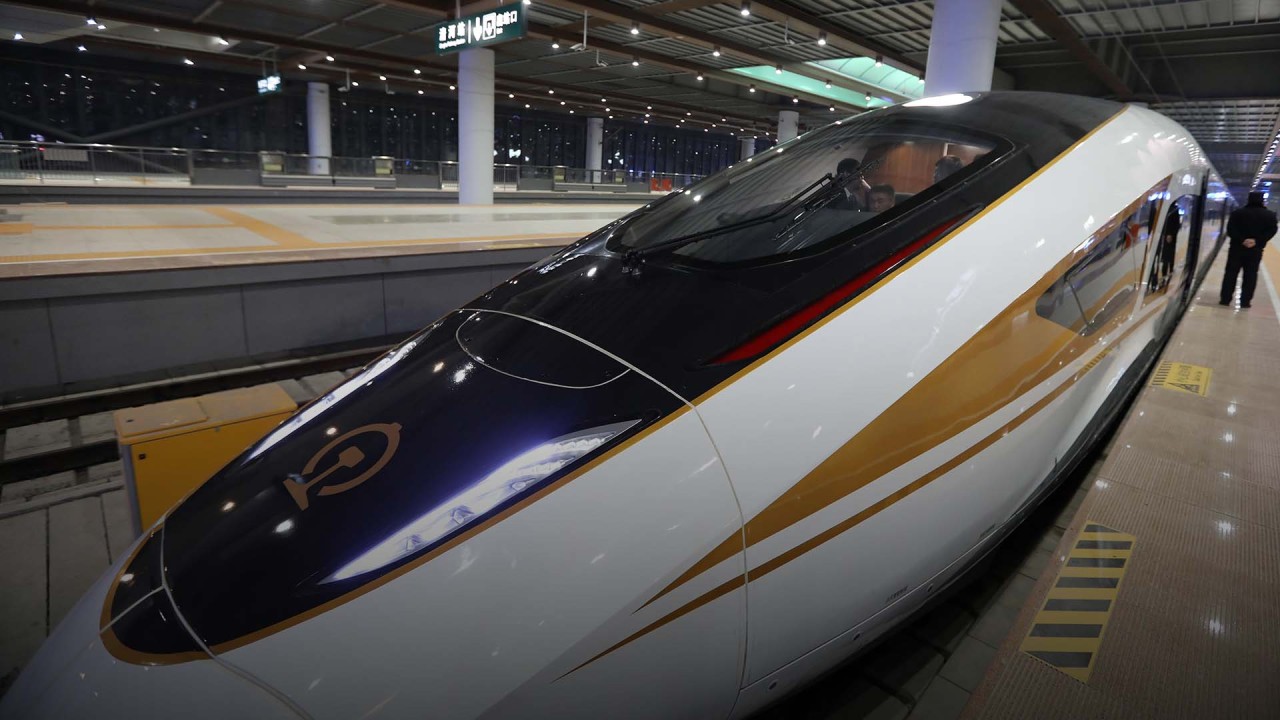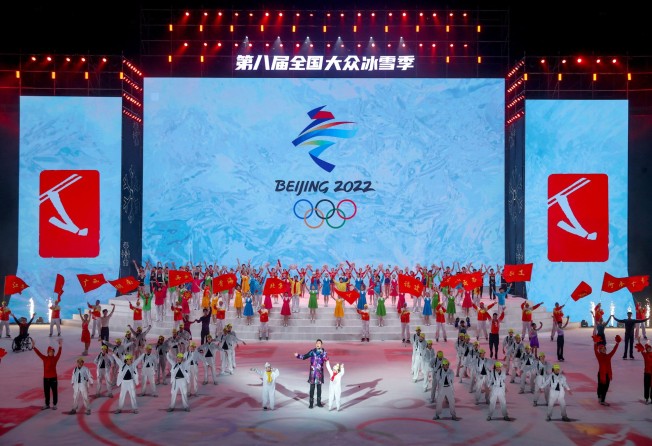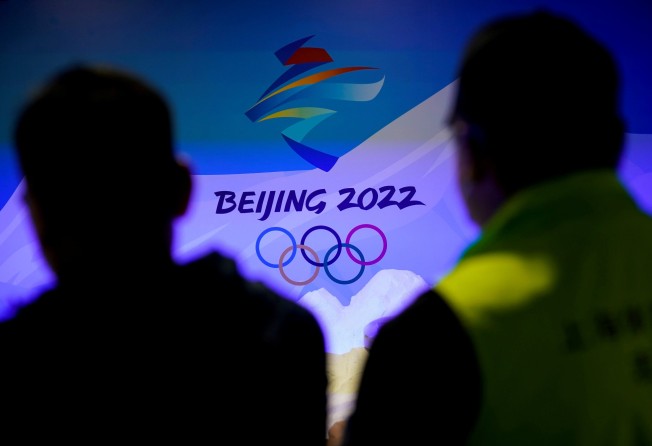
01:02
‘Self-driving’ high-speed railway line linking Beijing Winter Olympics cities nears completion

The Tokyo 2020 Olympic Games, which went ahead this year, marked the first instance of the landmark sporting event taking place amid a global pandemic, while previously the 1920 Games in Antwerp happened only months after the Spanish Flu had subsided.
Given China’s zero-Covid approach, next month’s Beijing Games is expected to feature stricter virus control measures than ever seen before, which some critics have suggested defeats the purpose of the Olympics entirely.
Key among these measures is the introduction of a “closed loop”, which acts as a bubble encompassing living quarters, competition venues, training venues, and other official facilities that the general public will not be allowed to access.
More details on the nature of the loop were laid out in the second version of Beijing’s Olympic playbook, released last week by the International Olympic Committee (IOC).
Christophe Dubi, the IOC’s Olympic Games executive director, told reporters that the creation of a “secure environment” provides a “unique Games-time experience” to help athletes focus on their sports.
“The attention remains on the outstanding performances we can expect from the world’s best winter athletes in Beijing next year,” Dubi said, while unveiling the latest playbooks on Monday.
All participants with direct access to the events, including referees, team officials, and media representatives, are required to stay inside the bubble until the end of the Games.
They can travel in designated vehicles to a range of “permitted destinations” inside the grounds, which spans three zones across Beijing, the city of Zhangjiakou, and the district of Yanqing.
In contrast, participants in Tokyo’s Olympics were not confined to one area, though they were required to submit an “activity plan” upon their arrival in Japan, detailing where they planned to go for the duration of the Games.

Athletes were allowed to take public transport if it was “the only way” to reach remote venues, according to the Tokyo Games’ final playbooks, though unnecessary travel was discouraged.
Additionally, athletes were given the option to take part in training camps organised by their countries’ Olympic Committees, and after the event, join a post-Games “host town exchange” led by the Japanese government to visit small towns across the country.
Maximilian de Courten, director of Victoria University’s Mitchell Institute for education and health policy, said that while mass population events were generally inadvisable to stem the spread of the virus, a bubble for all activities would offer the next best means of virus prevention.
“When your aim is to prevent the virus from spreading, then you would argue the tighter you can close things and keep people away and from mixing, the better it is,” said de Courten, who previously criticised the “mixed messages” behind virus safety measures at the Tokyo 2020 Olympics.
However, de Courten suggested that entirely closing off the area would defeat the international spirit of the Olympics, as athletes are traditionally given opportunities to “explore and interact” with locals, supporters, and other athletes from around the world.
“All that goes away and reduces the games only to what you then see on the TV screen, only [for athletes] to chase new records, get medals, and then go home,” he said.
“You drive it to an extreme where you can’t enjoy the Games any more.”
Other experts have also disagreed with the proposed implementation of the bubble.
Annie Sparrow, an assistant professor in public health at the Icahn School of Medicine at Mount Sinai in New York, pointed out that working in a closed-loop system would not be effective if the air inside the loop is not maintained, particularly in light of the highly infectious Omicron variant sweeping the world.
“The Omicron variant is a whole different ballgame ... it’s not feasible to imagine that it can’t come in with somebody,” Sparrow told the Post.
“Having a closed loop system absent of any attention paid to air filtration, air cleaning, and ventilation just makes no sense whatsoever.”
In order to make it past the closed loop’s strict boundaries, athletes are given no choice but to get vaccinated.

Although the Winter Olympics will allow unvaccinated athletes from overseas to compete, they may only enter the “closed loop” after undergoing 21 days of quarantine – which essentially closes the door for their chances to compete, given the lapse in training that would take place.
“No athlete is going to do that because they wouldn’t be able to train properly. It’s just mentally impossible,” said Sparrow, who also serves as a special advisor to the non-profit Centre for Sports and Human Rights.
“It’s dangerous because [the organisers] are pretending that vaccination is sufficient ... they have really set it up to be more dangerous than Tokyo and less transparent.”
Athletes who were fully vaccinated 14 days before arriving can enter the “closed loop” at the airport. Exemptions may be granted for attendees deemed medically unfit to be vaccinated, but local employees of the Games are required to receive a Covid-19 booster shot before entering the closed loop, at least 14 days before starting work.
The vaccination measures, announced in late October this year, spurred the committees of attending nations to impose vaccine mandates, requiring any athletes to get vaccinated if they wanted to compete. These countries include the United States, the United Kingdom, and Canada, of which athletes will still attend despite the diplomatic boycotts.
The Sports Federation and Olympic Committee of Hong Kong, which is under the IOC, did not answer questions on whether any athletes who wanted to compete were ruled out as a result of their vaccination status, but confirmed that the committee would closely follow Beijing’s health protection measures.
“We … encourage all [participants] to get vaccinated to ensure that they are healthy and free from the pandemic in order to focus on the training and participation of the Games,” the committee told the Post.
Testing is also a key issue for the Beijing Winter Olympics, anyone inside the closed loop, including athletes and other participants, will have to undergo daily tests for Covid-19. No exceptions to this rule were named by organisers.
Han Zirong, vice-president and secretary general of Beijing 2022, said on Monday that the countermeasures would reduce the risk of the virus, while ensuring athletes could “safely and conveniently” take part.
The Tokyo Olympics distinguished between nine categories for the frequency of testing, based on the participants’ risk of infecting others and level of responsibility in the Games.
Athletes staying in the Olympic Village, alongside any team officials or staff in regular contact with athletes, would need to be tested daily. However, other participants with less contact, such as marketing staff or sport-specific volunteers, would only need to be tested every four days, or seven days if they have close to no contact.
However, playbooks for both Games did not specify how long athletes will need to quarantine if they test positive, only that athletes would need to work closely with health authorities.